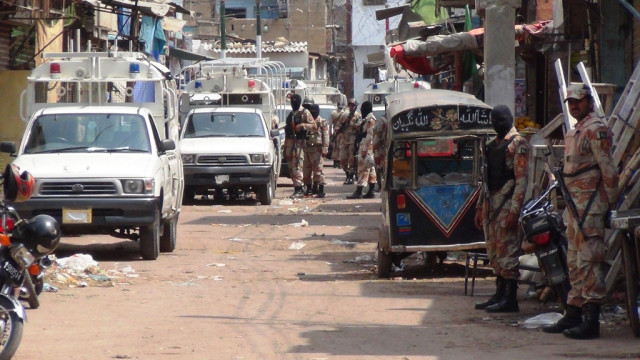Policing powers for Rangers questioned by SHC
Thebo appeared in court to answer questions on mechanism of the operation

A division bench, headed by Justice Ahmed Ali M Sheikh, passed this direction during the hearing of a petition seeking the whereabouts of a missing person.
Earlier, AIG Thebo had filed his report, explaining the mechanism of the raids being conducted by the police and the Rangers personnel.
Missing persons' cell
In his report, AIG Thebo said that officers conversant with the entire operation will appear in court at the next date to share details of the mechanism in which the police and Rangers conduct mass raids, the legal sanctions for such raids and arrests, the members of the law enforcement agencies who conduct the raids, the persons apprehended and the legal course adopted for the operation.
He said there were a number of complaints and even FIRs against law enforcement agencies regarding illegal arrests and detention of missing persons. To resolve these complaints, the Karachi police chief claimed he had ordered the DIGs of all ranges to establish a missing persons' cell in their jurisdictions and depute an officer of the SP rank there with immediate effect.
Explaining the cell's working mechanism, the judges were informed that the SP was required to collect the data of the missing persons on a daily basis from the relevant police station and forward the same to the specialised units of the Sindh police, including the Crime Branch, Crime Investigation Department, Crime Investigation Agency, Specialised Investigation Unit, Anti-Violent Crime Cell. These units will investigate the cases of missing persons and ensure their recovery. The officers are required to maintain the reports on a daily basis and also send these reports directly to the Member Inspection Team (MIT) of the Sindh High Court, along with progress report.
The officers would also ensure implementation of the requirement to seek prior permission from the area's magistrate to conduct mass raids in different areas. AIG Thebo said that the officers are required to implement these directives, which have been issued in compliance of the court's order passed on June 4, on a permanent basis in future.
He said that the Crime Branch Additional IG would supervise the matters of missing persons, while the concerned DIGs have been directed to comply with every directive issued by the supervisor.
He maintained that all possible efforts would be made trace out all such alleged missing persons, who would be produced before the court of proper jurisdiction. He said the Sindh Police IG has devised additional standard operating procedures (SOP) pertaining to the investigation of missing persons and has passed on directives to all the police units as well as made special amendments to the rules for such cases.
Karachi police chief assured the court that every directive, from the registration of FIRs to search operations will be dealt with in accordance with the law, as directed by the court.
He reiterated that the operation is being conducted by the police and Rangers in accordance with the provisions of the Criminal Procedure Code (CrPC) and the Anti-Terrorism Act, 1997, which are strictly followed in letter and spirit. Where police officers deviate from the laid down procedures, strict disciplinary proceedings are initiated against him, he added.
Rangers' role
The two judges directed the Karachi AIG to appear again on November 25 along with the relevant notification, including the mechanism for delegation of policing powers to the Rangers and other law-enforcement agencies.
Published in The Express Tribune, November 14th, 2014.



















COMMENTS
Comments are moderated and generally will be posted if they are on-topic and not abusive.
For more information, please see our Comments FAQ